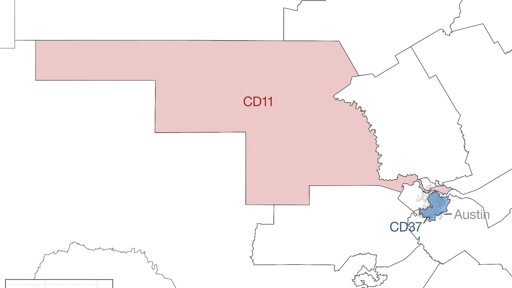As Texas Republicans try to muscle a rare mid-decade redistricting bill through the Legislature to help Republicans gain seats in Congress – at President Donald Trump’s request – residents in Austin, the state capital, could find themselves sharing a district with rural Texans more than 300 miles away.
The proposed map chops up Central Texas’ 37th Congressional District, which is currently represented by Democrat Rep. Lloyd Doggett, will be consumed by four neighboring districts, three of which Republicans now hold.
One of those portions of the Austin-area district was drawn to be part of the 11th District that Republican Rep. August Pfluger represents, which stretches into rural Ector County, about 20 miles away from the New Mexico border.



Gerrymandering can still be effective with ranked choice. It’s harder, but you can still do both cracking and packing, you just have to model top-2 or top-3 preferences.
Popular vote is already the norm for gerrymandered areas.
I mean we should definitely implement Ranked Choice up and down the ticket, and implement Popular Vote for President, but neither actually solves Gerrymandering.
I’d like to say “independent” redistricting organizations are the solution, but the practical success of those is mixed. The incumbents just pack those with cronies, or ignore them, sometimes with the assistance of the judiciary.
In Australia it’s kinda 4 different things that stops gerrymandering from being a problem:
We have RCV, but you’re completely right: that’s a solution to a whole different problem… and independent commissions are only part of the solution - you need to ensure their independence with rules that make it infeasible for them to be anything but non-biased
On the last bullet point, we probably need to federalize voter qualification and registration, first. Whether you can vote or not depends on what state you are in (felony disenfranchisement, e.g.). Some states let you register on voting day; others close registration weeks before voting day (and some incumbents try to purge voters as close to the deadline as possible). It’s really quite a mess. :(
I think if we made it easier to vote, we wouldn’t have to make it mandatory – federal holiday on voting day, open/unrestricted early voting for a least a week before voting day. I’m against mandatory voting unless there’s a “[X] Democracy is dead / a sham in $District” protest vote option or something similar. Incumbents already claim my support when I’m just trying harm-reduction and I actually support someone that never made it into the primary for wanting to tax the rich.
Yeah I think that’s the general consensus outside of Australia, but we fucking love it here… there have been a few very unpopular suggestions to repeal it, and we keep proving that it’s near universal that we love it